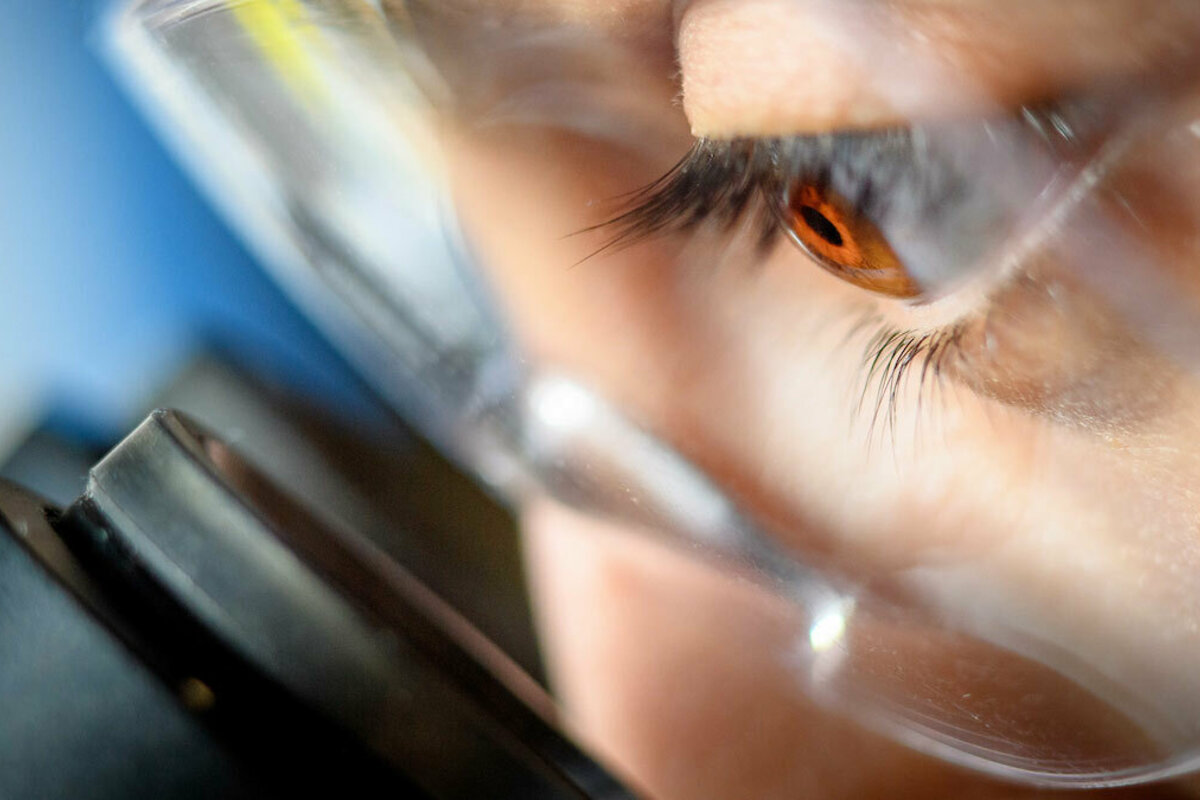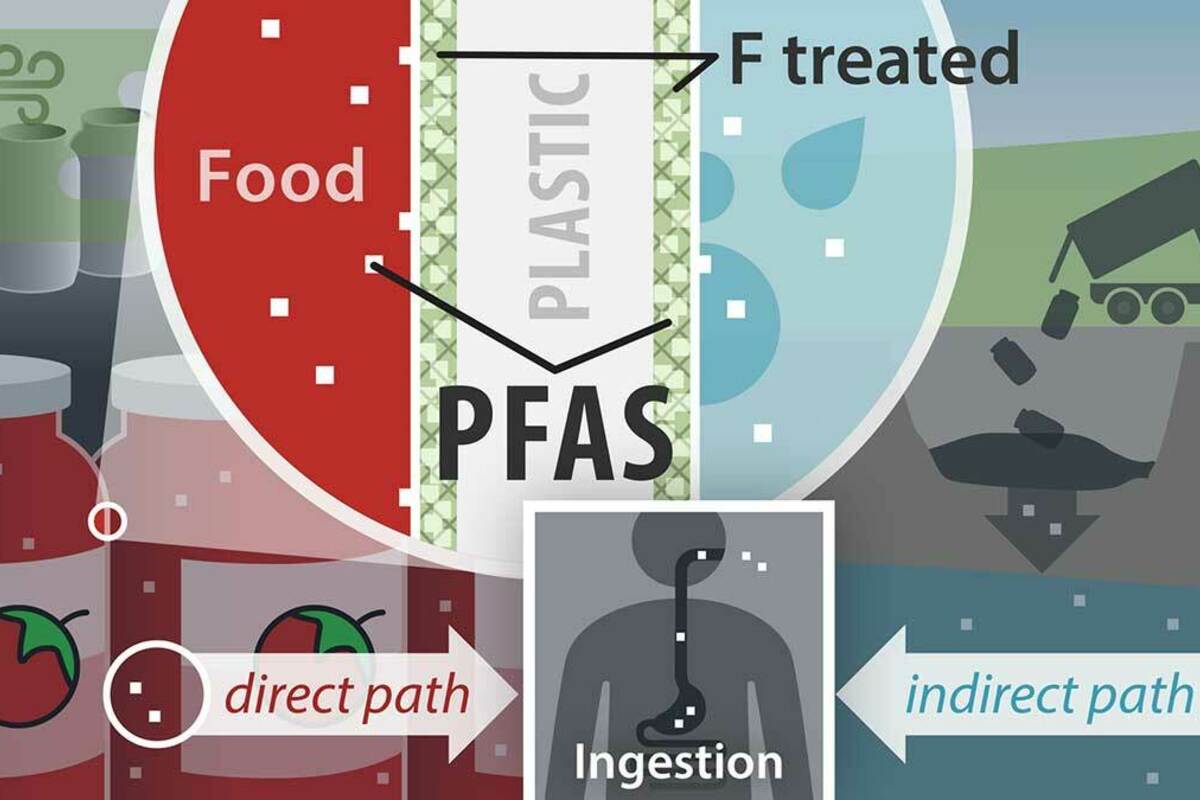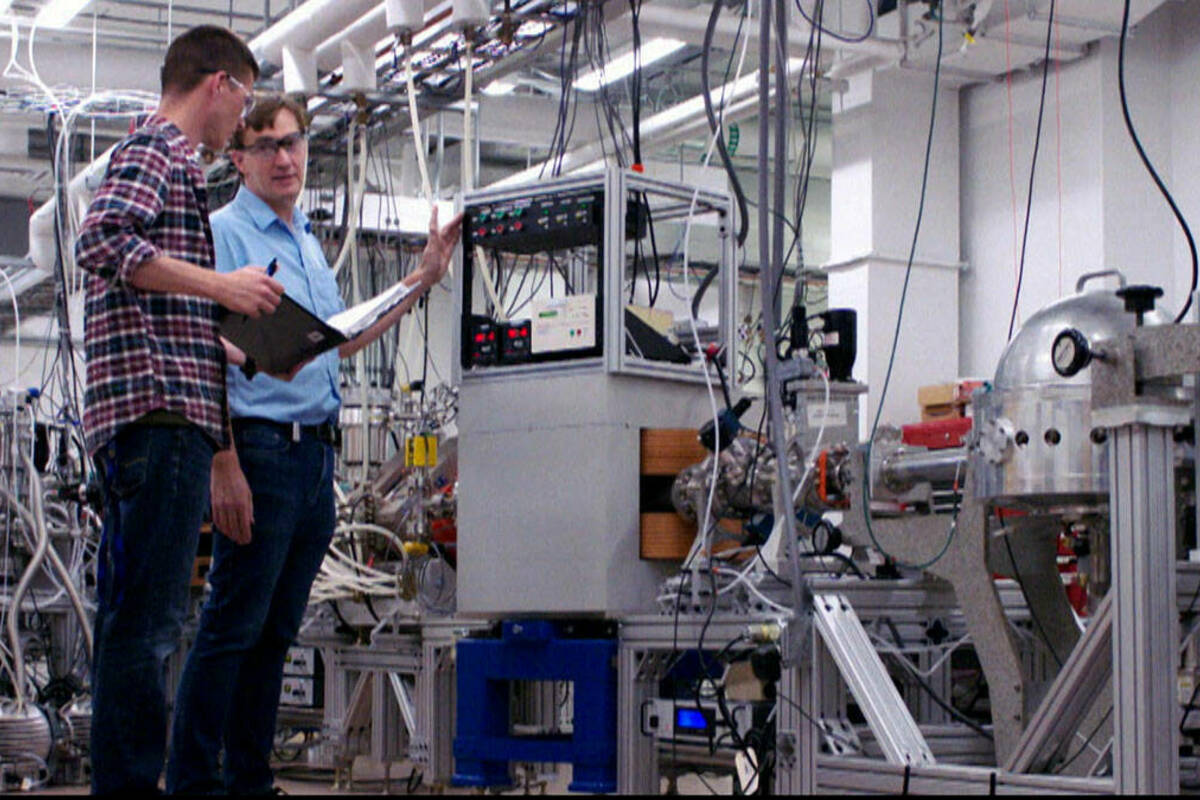

Experimental Nuclear Physics
Professor










Salon
July 05, 2024
These findings follow a 2023 study from the University of Notre Dame which found polyfluoroalkyl chemicals — or PFAs, also known as "forever chemicals" — in 123 menstrual products sold in the U.S.

The Washington Post
June 26, 2024
Waterproof cosmetics like mascara, long-wear matte lipsticks and waterproof clothing are examples of products with PFAS that could be absorbed through the skin, said Graham Peaslee, a physics professor at the University of Notre Dame who frequently tests for PFAS in everyday products.
The Cool Down
April 22, 2024
A landmark study by the University of Notre Dame found PFAS in tampon applicators, period underwear, disposable and reusable pads, and plastic wrappers, sounding the alarm for the safety of people who menstruate.
FOX5 NY
Video
April 11, 2024
Researchers at the University of Notre Dame tested more than 230 commonly-used cosmetics from top brands.

WVPE
April 11, 2024
A leading expert on the topic at the University of Notre Dame says the rule will save lives.

WSBT TV
April 11, 2024
Professor of Physics at the University of Notre Dame Graham Peaslee said, "They are a class of per- and polyfluoroalkyl substances, and they are all man-made. There's about 12,000 to 14,000, depending on how you count, and they are the ones that are created, they last forever in our environment and they get stuck in our bodies and the food that we eat and in the water we drink."

The Hill
April 03, 2024
She reached out to Graham Peaslee, a professor at the University of Notre Dame who was already well-known for discovering the presence of PFAS in fast food packaging.

CNN
March 25, 2024
If PFAS is in 45% of US water systems, the country will have a lot of work to do, said Dr. Graham Peaslee, a professor in the Department of Physics and Astronomy and concurrent professor of chemistry and biochemistry who does PFAS research at the University of Notre Dame.
North Carolina Health News
March 07, 2024
A study published in 2020 by University of Notre Dame researcher Graham Peaslee and colleagues found that PFAS compounds on the gear’s outer shell eventually degrade into dust particles that can become unstable and shed.
The Philadelphia Inquirer
March 01, 2024
Graham Peaslee, a University of Notre Dame physicist, first determined that firefighters’ equipment contained PFAS in 2018, after he studied 43 pieces of new and used turnout gear.
Chemical & Engineering News
March 01, 2024
Graham Peaslee, a PFAS scientist at the University of Notre Dame, also testified against the bill at both hearings.

The Washington Post
February 29, 2024
The FDA’s announcement “is a huge win for the public,” said Graham Peaslee, a physics professor at the University of Notre Dame who frequently tests for PFAS in everyday products.
The Philadelphia Inquirer
February 23, 2024
“Purely misleading testing that no reputable lab would do,” Graham Peaslee, a physicist at the University of Notre Dame, and a widely recognized expert on PFAS, wrote in an email to the newspaper.
The Philadelphia Inquirer (Subscription)
February 20, 2024
It may take as long as 10 years for more definitive studies to be complete, said Graham Peaslee, a physicist at the University of Notre Dame who has spent years studying PFAS compounds, particularly in turf, cosmetics, food packaging and firefighters’ turnout gear.

WVPE
February 14, 2024
Graham Peaslee, a physics and astronomy professor, is a leading authority on PFAS, often called “forever chemicals” that are in all sorts of everyday products because of their ability to resist water, stains, grease and heat.
Indianapolis Star
February 12, 2024
Graham Peaslee of the University of Notre Dame focused his research on firefighter gear.
WFYI
January 19, 2024
University of Notre Dame professor Graham Peaslee said we’re discovering new toxic effects of PFAS all the time and these chemicals will far outlive us all.
Technology Networks
December 20, 2023
More innovative methods like particle induced gamma-ray emission (PIGE) spectroscopy, pioneered by Dr. Graham Peaslee at the University of Notre Dame, is a rapid screening method for total fluorine, which is a marker for PFAS but includes non-PFAS too.”

Bloomberg
September 28, 2023
One of the first people she emailed those results to, in the summer of 2020, was Graham Peaslee, a nuclear physicist at the University of Notre Dame who’d pioneered a novel technique for revealing the presence of PFAS in everyday items.

Associated Press
September 14, 2023
Cotter sent patches of gear to Graham Peaslee, a University of Notre Dame professor who studies PFAS, for testing.

The New York Times
August 11, 2023
In early 2023, we bought and mailed 44 different products to Graham Peaslee, whose University of Notre Dame lab studies PFAS in the environment and has performed tens of thousands of tests looking for signs of contamination with these substances in consumer products.

The Independent
August 11, 2023
Researchers, including Graham Peaslee from the University of Notre Dame in the US, said while these products are designed to make people feel comfortable during a menstrual bleed, their labels do not usually list the ingredients.

Newsweek
August 11, 2023
"[PFAs] have demonstrated environmental persistence, can bioaccumulate, and are known to have human and environmental toxicity," research lead Graham Peaslee, a professor at the University of Notre Dame, told Newsweek.

The Washington Post
August 11, 2023
Researchers from the University of Notre Dame studied more than 120 different menstruation products — menstrual cups, pads, underwear and tampons — sold in the United States.
NWI
July 20, 2023
Graham Peaslee, a professor from Notre Dame University, and Leah Zimmer, a Notre Dame student, prepare to head out to collect dust samples in Gary.

CBS News
July 13, 2023
"We've since discovered that all these PFAS are immune suppressants, so they suppress your immune system and that means any opportunistic disease, including some types of cancer, could take over," said Graham Peaslee, who is a biochemist.

CNN
July 06, 2023
If PFAS is in 45% of US water systems, the country will have a lot of work to do, said Dr. Graham Peaslee, a professor in the Department of Physics and Astronomy and concurrent professor of chemistry and biochemistry who does PFAS research at the University of Notre Dame.

The Washington Post
June 06, 2023
“For the average consumer, there’s no way to avoid it,” said Graham Peaslee, a physics professor at the University of Notre Dame. “But, you can do some smart things.”
WBUR
April 19, 2023
“I got one of the 6,000 emails she sent,” recalled Graham Peaslee, a physics professor at the University of Notre Dame, who studies PFAS.
WVPE
April 10, 2023
But many firefighters and experts argue the standard set by that test is unreasonable. Among them is Graham Peaslee, a University of Notre Dame professor, who has used applied nuclear physics to measure and study PFAS in clothing, firefighter gear and various other materials.
Philadelphia Inquirer (subscription)
March 09, 2023
Reporters purchased these turf samples from four individual sellers on eBay, and had two pieces tested at the Lancaster, Pa., laboratory of Eurofins Scientific, an international group of 900 labs in 50 countries, and two samples at a lab at the University of Notre Dame.

Earth.com
March 09, 2023
The University of Notre Dame has recently conducted a study to determine if products containing PFAS (per- and polyfluoroalkyl substances) could negatively impact human health.
Connecticut Public Radio
March 09, 2023
Researchers at the University of Notre Dame found PFAS, sometimes called "forever chemicals," in 52% of cosmetics.
Philadelphia Inquirer (subscription)
March 09, 2023
Researchers at the University of Notre Dame tested additional samples of the Vet’s turf, and also found the chemicals.
Technology Networks
March 08, 2023
“Not only did we measure significant concentrations of PFAS in these containers, we can estimate the PFAS that were leaching off creating a direct path of exposure,” said Graham Peaslee, professor of physics in the Department of Physics and Astronomy at Notre Dame and an author of the study.
Philadelphia Inquirer (subscription)
March 07, 2023
“Once PFAS gets into [a person’s] blood, they circulate through all the organs,” said Graham Peaslee, a physicist at the University of Notre Dame who has spent years studying PFAS compounds.
Buzzfeed News
February 14, 2023
“One of the companies was using PFAS on the inner side of the underwear, which is really an odd place to use it,” said Graham Peaslee, professor and PFAS researcher at the University of Notre Dame, adding that it might be a water- or stain-resistant feature of the underwear.

Time
February 10, 2023
“It assumes you have a lifetime of drinking water,” says Graham Peaslee, professor of physics at the University of Notre Dame, who is also active in PFAS research and whose lab conducts regular tests of products for the substances.
Verywell Health
February 02, 2023
While Thinx advertised its products were free of harmful chemicals, Sierra reporter Jessian Choy was able to prove otherwise back in 2020 with the help of Graham Peaslee, PhD, a physics professor at the University of Notre Dame.
Consumer Reports
February 02, 2023
Choy decided to get the products tested herself. She sent samples of two brands to a lab at the University of Notre Dame in Indiana run by Graham Peaslee, PhD, a leading PFAS researcher.
Frederick News Post
February 02, 2023
Two nationally renowned scientists are testifying and available for interviews before or after the hearing: Dr. Graham Peaslee, a nuclear chemist and a professor at Notre Dame who has been working on PFAS since 2014 and is now considered one of the world’s top experts.

The Hill
January 31, 2023
Diane Cotter eventually sent samples of the gear to Graham Peaslee of the University of Notre Dame, who was able to test the items for PFAS content.

ABC News
January 30, 2023
An article published in 2020 by Sierra magazine first brought attention to the ingredients in Thinx products. The article's author, Jessian Choy, had Thinx menstrual underwear and a similar product from another brand tested by Dr. Graham Peaslee, a physics professor at the University of Notre Dame, whose research focuses on PFAS.

WSBT TV
Video
January 21, 2023
The smoke firefighters are up against today is more toxic than ever, according to Graham Peaslee, a Professor of Physics at the University of Notre Dame.

NBC News
January 20, 2023
The presence of PFAS appears to have been first reported in January 2020 in the Sierra Club’s magazine, “Sierra,” with the headline, “My Menstrual Underwear Has Toxic Chemicals in It.” Reporter Jessian Choy sent her Thinx to a University of Notre Dame nuclear scientist, who found high levels of PFAS, “especially on the inside layers of the crotch.”

The New York Times
January 20, 2023
The presence of PFAS in Thinx products was first revealed in January 2020, when Sierra magazine published an investigation, in partnership with a researcher at the University of Notre Dame, that found these chemicals in the crotch area of Thinx underwear.

NPR
January 19, 2023
In 2020, reporter Jessian Choy sent several pairs of Thinx underwear to a University of Notre Dame laboratory, which found high levels of fluorine and concluded that the underwear contained PFAS.

Daily Mail
January 18, 2023
Jessian Choy wrote in the Sierra magazine at the time that she sent the pairs to Dr. Graham Peaslee, a nuclear scientist at the University of Notre Dame.
The Cut
January 17, 2023
Back in 2020, a journalist for Sierra magazine investigated the potential risks of period underwear, sending two brands, including Thinx, to an independent scientist at the University of Notre Dame.
Popular Science
November 14, 2022
“PFAS are a class of chemicals that are characterized by extremely long environmental persistence,” says Graham Peaslee, professor of physics at the University of Notre Dame who was not involved in the study.

PBS NewsHour
September 28, 2022
“This stuff is toxic at incredibly low levels and it’s persistent — it stays there for hundreds of years in the groundwater, thousands of years,” said Graham Peaslee, a Notre Dame professor and researcher who’s tested many products for PFAS in his lab.

phys.org
September 21, 2022
In a study published in Environmental Science and Technology, scientists at the University of Notre Dame, Indiana University, the University of Toronto and the Green Science Policy Institute analyzed a variety of children's textiles.

U.S. News & World Report
September 21, 2022
“What was surprising about this group of samples was the high detection frequency of PFAS in the garments required for children to wear,” said study co-author Graham Peaslee, a professor of physics at the University of Notre Dame.

The Hill
September 21, 2022
“What was surprising about this group of samples was the high detection frequency of PFAS in the garments required for children to wear,” study co-author Graham Peaslee, a professor of physics at Notre Dame, said in a statement.

The Hill
September 21, 2022
Vulnerable and unaware: “What was surprising about this group of samples was the high detection frequency of PFAS in the garments required for children to wear,” study co-author Graham Peaslee, of the University of Notre Dame, said in a statement.

The Guardian
September 21, 2022
“It’s one of those things where you hang your head and say ‘What are they thinking?’” said co-author and University of Notre Dame researcher Graham Peaslee.
KSN
Video
August 25, 2022
“1.2 million firefighters are wearing this,” Dr. Graham Peaslee, a Notre Dame professor who conducted the study, said.
Indiana Environmental Reporter
August 24, 2022
University of Notre Dame researchers, like professor of chemistry and biochemistry Graham Peaslee, have found PFAS chemicals in fast food packaging, firefighter turnout gear and cosmetics.

The Guardian
July 06, 2022
“Industry has had a 70-year head start and we’re never going to catch up,” said Graham Peaslee, a University of Notre Dame researcher.

Scientific American
June 15, 2022
“We’ve seen fluoro groups in insecticides, but I would not call those PFAS,” says Graham Peaslee, a professor of physics at the University of Notre Dame.

CNN
March 25, 2022
“I would not urge consumers to take these brand names and only go to this one or that one, as this investigation only looked at just over 100 products,” said Graham Peaslee, a professor of physics, chemistry and biochemistry at the University of Notre Dame in Indiana.
Consumer Reports
March 24, 2022
That’s because all PFAS contain organic fluorine, and there are few other sources of the compound, says Graham Peaslee, PhD, a professor of physics, chemistry, and biochemistry at the University of Notre Dame in Indiana, who has studied PFAS in food packaging.

The Guardian
March 24, 2022
That’s because all PFAS contain organic fluorine, and there are few other sources of the compound, says Graham Peaslee, PhD, a professor of physics, chemistry and biochemistry at the University of Notre Dame in Indiana, who has studied PFAS in food packaging.
The Times of Northwest Indiana
February 23, 2022
Residents filled "milk jugs, their favorite aquarium tank and two-liter pop bottles" with tap water from their homes, explained Graham Peaslee, professor of chemistry and biochemistry at the University of Notre Dame.

CBS News
Video
February 17, 2022
Interview with Graham Peaslee, physics.
Verywell Health
February 03, 2022
“I'm afraid there are almost no consumer products that are entirely free of PFAS at this point,” Graham Peaslee, PhD, professor of physics at the University of Notre Dame, who is not affiliated with the report, told Verywell.
Environmental Health News
December 03, 2021
Graham Peaslee, senior author of the Notre Dame study and professor of physics at the University of Notre Dame, noted in a press release that regular lipstick wearers could ingest a few pounds of lipstick in their lifetime.
WSB-TV
Video
November 02, 2021
“We think that there’s intentional use of this that’s not being declared. We think that the consumer has the right to know what they’re buying,” said Graham Peaslee, Ph.D. a physics professor at the University of Notre Dame.

The Washington Post
October 18, 2021
“These results are particularly concerning when you consider the risk of exposure to the consumer combined with the size and scale of a multibillion-dollar industry that provides these products to millions of consumers daily,” Graham Peaslee, a physics professor and one of the study’s lead authors, said in a statement.
InStyle
October 08, 2021
As a study published by researchers at the University of Notre Dame in mid-June found, the problem extends far beyond one palette.
Men's Health
September 21, 2021
“PFAS is insidious; it’s one of the most persistent chemicals ever made,” says Graham Peaslee, Ph.D., a professor at Notre Dame and one of the world’s leading PFAS researchers.
WVPE
Audio
August 27, 2021
Guest: Graham Peaslee, Professor of Experimental Nuclear Physics, University of Notre Dame.
The Atlanta Journal-Constitution
August 18, 2021
A recent study from researchers at the University of Notre Dame sent me running back for yet another makeup check.

The Washington Post
August 11, 2021
The study was led by scientists at the University of Notre Dame and published in the Journal of Environmental Science & Technology Letters.

The Guardian
August 06, 2021
Graham Peaslee, a physics professor at the University of Notre Dame, led the study that inspired legislators to act again on this issue.
Woman's World
July 03, 2021
“Lipstick wearers may inadvertently eat several pounds of lipstick in their lifetimes,” Graham Peaslee, senior study author and professor of physics at the University of Notre Dame said in a press release.

Business Insider
June 24, 2021
The bills follow a study conducted by The University of Notre Dame that tested US makeup products from Ulta Beauty, Sephora, Target, and Bed Bath & Beyond.
Smithsonian
June 22, 2021
University of Notre Dame researchers tested 231 frequently-used makeup products, including liquid foundation, concealer, blush, lipsticks, and mascara, reports Tom Perkins for the Guardian.
Everyday Health
June 22, 2021
“These results are particularly concerning when you consider the risk of exposure to the consumer combined with the size and scale of a multibillion-dollar industry that provides these products to millions of consumers daily,” says senior study author Graham Peaslee, PhD, a professor of physics at the University of Notre Dame in Indiana.

Popular Science
June 19, 2021
“There’s no way for an average consumer to read a label and understand what’s in the product they just purchased,” Graham Peaslee, senior author of the study and professor of physics at the University of Notre Dame told the Washington Post.
WVPE
June 18, 2021
A University of Notre Dame study has found many cosmetics sold in the United States may contain high levels of PFAS, a class of toxic chemicals.
Chemical & Engineering News
June 16, 2021
The work, led by physics professor Graham Peaslee of the University of Notre Dame, involved testing more than 200 cosmetics purchased in the two countries.
Science News
June 16, 2021
“There is no known good PFAS,” says chemist and physicist Graham Peaslee of the University of Notre Dame in Indiana.

phys.org
June 16, 2021
Many cosmetics sold in the United States and Canada likely contain high levels of per- and polyfluoroalkyl substances (PFAS), a potentially toxic class of chemicals linked to a number of serious health conditions, according to new research from the University of Notre Dame.
Technology Networks
June 16, 2021
Many cosmetics sold in the United States and Canada likely contain high levels of per- and polyfluoroalkyl substances (PFAS), a potentially toxic class of chemicals linked to a number of serious health conditions, according to new research from the University of Notre Dame.
CBC
June 16, 2021
In the new study, Heather Whitehead, a graduate student in chemistry at the University of Notre Dame in Indiana, and her collaborators looked at 231 cosmetic products purchased in Canada and the U.S., including 17 Canadian products, most of which did not have PFAS listed on the label.
Shape
June 16, 2021
After testing 231 cosmetics - including foundations, mascaras, concealers, and lip, eye, and eyebrow products - from stores such as Ulta Beauty, Sephora, and Target, the University of Notre Dame researchers found that 52 percent contained high levels of per- and polyfluoroalkyl substances (PFAS).
UPI
June 15, 2021
"Lipstick wearers may inadvertently eat several pounds of lipstick in their lifetimes," study co-author Graham Peaslee said in a press release.

Fox News
June 15, 2021
"Lipstick wearers may inadvertently eat several pounds of lipstick in their lifetimes," Graham Peaslee, study senior author and professor of physics at the University of Notre Dame, said in a news release.

The Washington Post
June 15, 2021
“We were shocked to see how much is in some of these products,” said Graham Peaslee, a professor of physics at the University of Notre Dame and the principal investigator on the study, which was published in the journal Environmental Science and Technology Letters.
IFLS
June 15, 2021
“These are products that are applied around the eyes and mouth with the potential for absorption through the skin or at the tear duct, as well as possible inhalation or ingestion,” study author Graham Peaslee, professor of physics at the University of Notre Dame, said in a statement.

CNN
June 15, 2021
"We found fluorine as a surrogate for PFAS was in all sorts of cosmetics. We didn't expect almost every cosmetic to light up like it did," said study author Graham Peaslee, a professor of physics, chemistry and biochemistry at the University of Notre Dame.

Newsweek
June 15, 2021
More than half of cosmetics products sold and used in the U.S. and Canada contain cancerous chemicals, according to a new study released by the University of Notre Dame.

Associated Press
June 15, 2021
Researchers at the University of Notre Dame tested more than 230 commonly used cosmetics and found that 56% of foundations and eye products, 48% of lip products and 47% of mascaras contained fluorine — an indicator of PFAS, so-called “forever chemicals” that are used in nonstick frying pans, rugs and countless other consumer products.
E&E News
June 15, 2021
Graham Peaslee, senior author of the study and a professor of physics at the University of Notre Dame, said in a statement that chemicals in makeup are largely unregulated in the United States and Canada, which creates challenges around conveying safety information to the public.
Northwest Indiana Times
June 03, 2021
Professor Graham Peaslee, of the University of Notre Dame, and his graduate students developed a method for rapidly testing water for lead, Peller said.
WHDH
June 03, 2021
“When we saw the results, I thought to myself, ‘Oh, my gosh, she’s correct.’ It was scary,” Dr. Graham Peaslee said.
mlive
May 13, 2021
A 2020 study led by University of Notre Dame researcher Graham Peaslee found that large amounts of PFAS in firefighter gear is leaching into inner layers of their coats.

Wired
February 28, 2021
Sierra Club writer Jessian Choy sent in several pairs of her Thinx underwear and Lunapads (now called Aisle) to Graham Peaslee, a physics and chemistry researcher at the University of Notre Dame.

The Guardian
February 23, 2021
The levels for several compounds are what Graham Peaslee, a University of Notre Dame PFAS researcher, called “unusually high” and at quantities at which toxicologists say they start seeing links to health problems.
E&E News
February 16, 2021
"Once you have this test, all moisture barriers, and therefore all turnout gear, must contain PFAS," said Graham Peaslee, a researcher and professor of experimental nuclear physics at the University of Notre Dame.

The Boston Globe
February 06, 2021
Graham F. Peaslee, a physics and biochemistry professor at the University of Notre Dame and coauthor of the study, said the research appeared to corroborate his previous studies.

The New York Times
January 26, 2021
And while some forms of PFAS are being phased out, the replacements have not been proven to be safer, said Graham F. Peaslee, a professor in experimental nuclear physics, chemistry and biochemistry at Notre Dame who led the study.

Bloomberg
January 19, 2021
She’s spent years advocating against the dangers of PFAS in gear, and helped bring about a study by Notre Dame physicist Graham Peaslee that exposed high levels of PFAS in turnout gear.
Law & Crime
January 14, 2021
“There’s 1.2 million firefighters out there and nobody is telling them about this stuff,” University of Notre Dame professor Graham Peaslee said in an interview this week on the Law&Crime Network’s Brian Ross Investigates.

The New York Times
December 03, 2020
We also spoke with Rolf Halden, director of the Biodesign Center for Environmental Health Engineering at Arizona State University, and with University of Notre Dame nuclear physicist Graham Peaslee (whose lab tested period underwear sent in by a columnist for the Sierra Club magazine) about chemicals found in treated garments, including some period underwear.